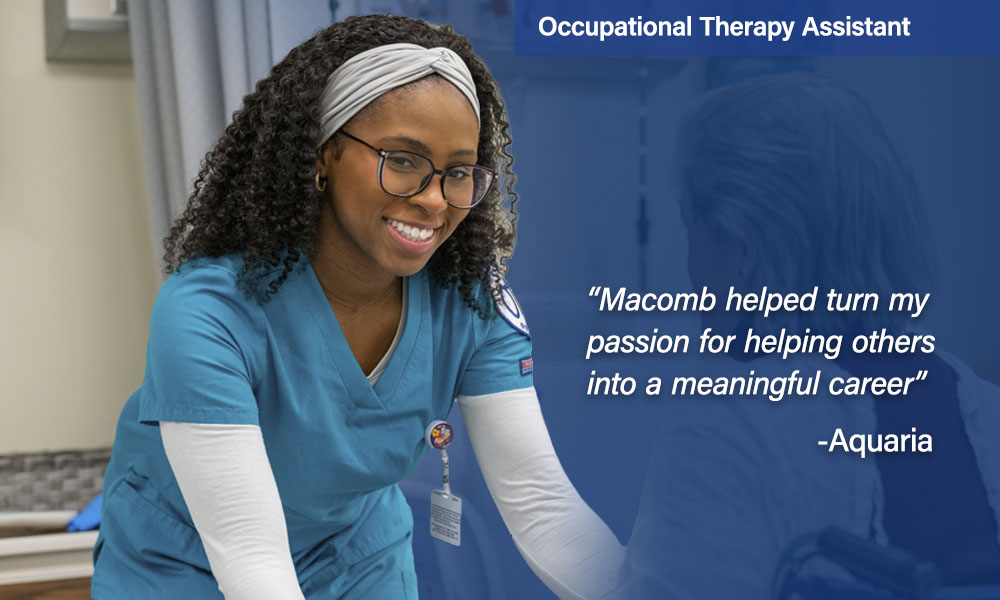Become a Certified Occupational Therapy Assistant
Want a career that changes lives? Occupational Therapy Assistants (OTAs) help people overcome physical and cognitive challenges so they can live life to the fullest.
Under the direction of licensed Occupational Therapists, you’ll use hands-on techniques and creative solutions to improve independence in everyday life.
Our accredited OTA program gives you real-world clinical experience and prepares you for certification.
For a look at all the courses in our Occupational Therapy Assistant program, consult the course list.

Hands-on learning that prepares you for certification
The faculty in our program are all occupational therapists with extensive experience working with patients.
Through lecture, lab and clinical fieldwork, they’ll teach you about the occupational therapy process, including assessment and intervention.
With their guidance and encouragement, you’ll gain the knowledge and skills you need to pass the National Board for Certification in Occupational Therapy exam.
Courses include:
- Clinical Kinesiology
- Human Development & Clinical Interaction
- Human Physiological Anatomy
- Introduction to Physical Rehabilitation
- Mental Health Conditions
- Pediatric Occupational Therapy – Lab & Lecture
- Productive Aging
- Rehabilitation Conditions and Intervention Planning
- Therapeutic and Psychosocial Intervention
- And much more!
Your career at a glance
Explore the opportunities and salaries available locally with the tool below, as well as what would be available to you if you earned a bachelor’s degree from a four-year college or university and became an occupational therapist.
Our Career Services team can help you with the job search and interview preparation, including resume-development.
Additional Information
Select programs in Health and Human Services require specific criteria to gain admission, such as testing requirements or minimum grade point average in prerequisite courses. Please view the Selective Admissions program application packet for information on application requirements, ranking and deadlines.
For information on how to apply to a Selective Admissions program, please email us at selectiveadmissions@macomb.edu. Selective Admissions applicants are encouraged to meet with an academic advisor or counselor prior to submitting an application to the program. This meeting will allow for review of the application process, program prerequisites and requirements. Contact the Counseling and Academic Advising Office at 586.445.7999 for office hours.
| Graduation Year | Students Entering | Students who withdrew, or did not graduate with entering cohort, for reasons other than academic performance | Students Graduating | Graduation Rate |
|---|---|---|---|---|
| 2025 | 18 | 0 | 18 | 100% |
| 2024 | 28 | 2 | 24 | 92% |
| 2023 | 25 | 6 | 18 | 98% |
| Total | 71 | 8 | 60 | 97% |
National Board for Certification in Occupational Therapy (NBCOT®) program data results: https://www.nbcot.org/Educators-Folder/SchoolPerformance
The Occupational Therapy/Occupational Therapy Assistant program is accredited by the Accreditation Council for Occupational Therapy Education (ACOTE) of the American Occupational Therapy Association (AOTA), located at 7501 Wisconsin Avenue, Suite 510E, Bethesda, MD 20814. ACOTE’s telephone number, c/o AOTA, is 301.652.AOTA (2682) or 301.652.6611, and its web address is www.acoteonline.org.
Graduates of the program will be eligible to sit for the national certification examination for the occupational therapy assistant administered by the National Board for Certification in Occupational Therapy (NBCOT). After successful completion of this exam, the individual will be a Certified Occupational Therapy Assistant (COTA). In addition, all states require licensure in order to practice; however, state licenses are usually based on the results of the NBCOT Certification Examination. Note that a felony conviction may affect a graduate’s ability to sit for the NBCOT certification examination or attain state licensure.
Costs associated with the Occupational Therapy Assistant program
| Current Cost | OTA Program 2023 Fall Semester | OTA Program 2024 Spring Semester | OTA Program 2024-2025 Academic Year | Total Cost of Program (2-year program 2023-2025) |
|---|---|---|---|---|
|
Tuition/Student Fees |
$1,503 | $1,503 | $2,451 | $5,457 |
|
Books & Supplies |
$915.94 |
$953.99 |
$780.10 |
$2,650.03 |
| Lab Fees | $115 | $460 | $690 | $1,265 |
|
Distance Ed Fees |
0 | 0 | 0 | 0 |
| Total | $9,372.03 |
Illustration based on a 3% increase annually, however fees are subject to change.
According to FASFA (Free Application for Federal Student Aid), cost of attendance is defined as total amount of attending the program, which includes tuition and fees, books, supplies, transportation, loan fees as well as fees associated with distance education.
The goal of the Health and Public Services Division is to prepare every student to think critically and practice competently and compassionately in rapidly changing environments. All efforts are designed to build knowledge, enhance practical skills, and promote patient and the population’s safety. Furthermore, the program is designed to foster professional integrity and ultimately improve the health outcomes and protection of patients, families, and communities across the continuum of care and practice. Students must possess certain functional abilities, essential for the delivery of safe, effective clinical care and protection of the public during clinical and internship training activities in the field. Therefore, the faculty has determined that certain technical standards are required for admission to, progression in, and graduation from the Health and Public Services (HPS) programs.
In addition to classroom learning, clinical and internship learning occurs throughout the HPS programs and involves considerations (such as patient and population safety and clinical and internship facility safety) that are not present in classroom accommodations. Applicants or students interested in HPS programs who seek accommodations prior to or immediately after enrolling in the college are highly encouraged to also request an assessment of the types of reasonable accommodations needed for the clinical and or internship components of the program.
An individual must be able to independently, with or without reasonable accommodation, meet the following technical standards of general abilities: (1) observation; (2) communication; (3) motor skills; (4) intellectual, conceptual, and quantitative abilities; (5) essential behavioral and social attributes; and (6) ability to manage stressful situations. Individuals unable to meet these technical standards, with or without reasonable accommodation will not be able to complete the programs and are counseled to pursue alternative careers.
SPECIAL SERVICES STATEMENT: Students may individually discuss the essential functions and technical standards with a college counselor from our Special Services department. In compliance with Section 504 of the Rehabilitation Act of 1973 and the American Disability Act of 1991, academic accommodations may be provided to students who have a documented disability.
For further information, visit Special Services.


